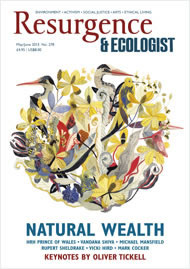Can business be a force for good? Should it strive for more than just limiting its harm? I think we intuitively know it can; yet it requires courage to break rank from the mainstream approach to business.
The prevailing business paradigm of maximisation, monoculture, self-interest and short-termism is weakening its own resilience, in turn sowing the seeds of its own demise. Our business concepts, values, perceptions and practices are being disrupted and systemically challenged. This ‘perfect storm’ of crises provides a situation for individuals and organisations to retrench or transform. Those who are able to adapt in these volatile times face nothing less than a shift to a new business paradigm: a way forward that seeks to enhance life on Earth rather than destroy it. Like the ancient Chinese proverb: in times of great winds some build bunkers, others build windmills.
Our approach to business has encouraged us to see ourselves as separate from Nature, and to view the world around us as something to be analysed and exploited for our own wants and needs. The sobering fact of the matter is that this approach (and its immense power to fuel problems as well as implement solutions) is neither balanced nor life-encompassing: it is reductionist and anthropocentric in its belief and behaviour. This reductionist view of the world has encouraged an alienation from Nature, leaving us unbalanced in our understanding of the real world – the world not just of stock market trends and commodity prices, but also of soil and sea, of cycles and seasons, and of ecosystems and environments.
Ray Anderson, former Chair and CEO of Interface, observed: “We have been, and still are, in the grip of a flawed view of reality – a flawed paradigm, a flawed world view – and it pervades our culture putting us on a biological collision course with collapse. It is the paradigm that is reflected in our culture’s infatuation with stuff and our willful ignorance of Nature.”
When Charles Darwin published his Origin of Species, the phrase ‘survival of the fittest’ was quickly co-opted and distorted by powerful elites to promote the idea that only the biggest, strongest and most powerful can survive. In reality, what Darwin found and described in his findings was that those organisms with the greatest ability to adapt to their local environment would survive when and where others would fail. He found that sensing, responding, adapting, and aligning with and within the local ecosystem were key to survival. Recent scientific discoveries, coupled with advances in systems thinking and quantum theory, continue to build on these findings, and uncover a more complex and holistic view of Nature, the workings of the universe, and the evolution of life.
So how does business go about shifting from a mindset of short-term profit maximisation that views the world as a collection of things to be consumed, to a worldview that has an energetic and material engagement with place and a symbiotic relationship with life? In short, how does the prevalent approach of business break its devastating illusion of being apart from Nature to realise that we are a part of Nature, even with our specialities?
This question of the moment can be answered through three Rs – Redesign, Reconnect, Rekindle:
1. Redesigning – new ways of operating and innovating beyond ‘less bad’ into ‘doing good’ (shifting from the take/make/waste economic paradigm to a regenerative approach that heals society and the web of life rather than destroying life in the name of short-term gain).
2. Reconnecting – reconciling our human relationship with life/Nature and our own authentic human nature (re-establishing our vital bond with ourselves, our neighbours and the web of life of which we are a part, through education, authentic leadership and ecopsychology).
3. Rekindling wisdom – working with the grain of Nature and operating within the rules of life on Earth (enabling businesses and societies not merely to ‘sustain’ but to thrive in the years ahead by practising wise approaches to life that draw on symbiosis, ecological thinking, permaculture, systems-thinking and systems-being, business inspired by Nature and Indigenous wisdom).
In these challenging times for business, we must realise that to become truly sustainable, business life has to become scientifically inspired, emotionally connected and spiritually entwined with Nature and Gaia. Nature and business must be symbiotic and operate in mutualism for there to be anything resembling a successful outcome.
The sooner business realises the opportunities that come with being connected to and inspired by Nature, the better for humanity and the interconnected fabric of life.






